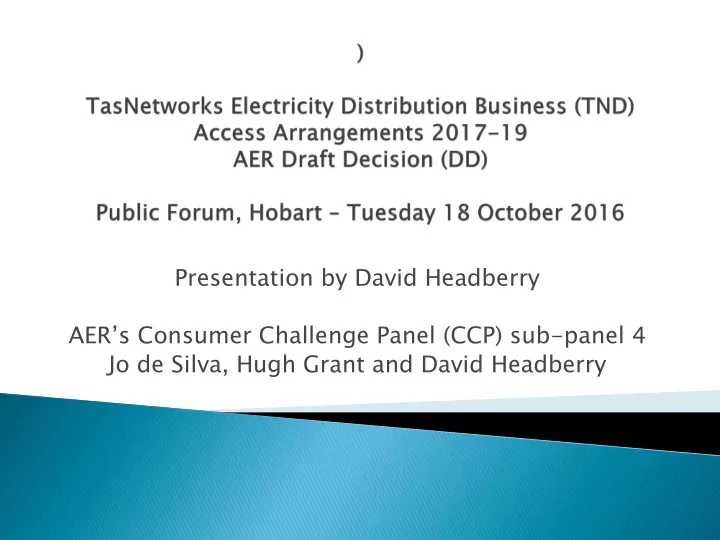

Presentation by David Headberry AER’s Consumer Challenge Panel (CCP) sub -panel 4 Jo de Silva, Hugh Grant and David Headberry
AER accepted the TND proposed opex and capex TND accepted use of the AER RoR guideline (subject to the NSW DB appeal) TND wanted gamma = 0.25 but AER used 0.4 AER adjusted the EBSS carryover AER has a slightly lower inflation forecast and a lower RAB starting point which reduce the depreciation requirement
There is a high level of AER acceptance of the TND proposal which is reflected in the revenue allowance
While prices under the DD are forecast to fall further than proposed by TND, this is primarily a result of ◦ a lower cost of capital, ◦ an adjustment to the EBSS calculation ◦ using a higher value for gamma. Prices are essentially revenue divided by consumption. The main driver of revenue is RAB x WACC. The RAB is still increasing (the DD allows some $120m increase over the two years) but this increase is masked by the current low cost of capital
The main difference between TND and the DD is a lower risk free rate and gamma Since the DD the risk free rate has already increased by about 30 basis points and this will about halve this difference between TND and the DD return on capital The Competition Tribunal has stated that gamma should be 0.25 as sought by TND but the AER has appealed the Tribunal decisions Reducing gamma increases revenue for a reason not related to TasNetworks So the difference in revenue between TND proposal and DD could halve at least
In its proposal, TND built in a significant reduction in opex The AER considers that the TND proposed opex is lower than what the AER would otherwise have allowed On this basis, the AER accepted the TND proposal While there is a concern that the AER assessment is too high, TND needs to be recognised for its decision to arbitrarily increasing its productivity
Capex is what increases the RAB. As the RAB is probably already too high, capex needs to be limited, especially as the utilisation of most of TND assets is already low and falling AER accepts the TND capex proposal which is only 10% lower than in the last regulatory period, even though there is no demand growth Augmentation capex (augex) is quite low (as expected when demand remains flat) but there is some reinforcing of the network which should increase reliability on low performing feeders and constraint reductions in other parts of the network, increasing average reliability. Replacement capex is higher than in past years, again increasing average reliability
TND accepted the use of the STPIS, EBSS and CESS, but with some modifications We consider the three schemes work together and should be internally consistent. On this basis, we agree with the AER DD that ◦ the STPIS should not reduce the revenue at risk (will be +/- 5% as in AER scheme) ◦ exclusions in the EBSS should be limited to items not forecast based on revealed expenditure We agree with the AER DD accepting the small increase of DMIA pending the wider review of the DMIS
Consumers have made it clear that they consider prices for electricity are too high and want them lower They also said clearly that reliability of supply (absent the Basslink failure!) that they were not prepared to pay more for improved reliability On this basis both the TND proposal and the AER DD appear to have delivered these outcomes
There are lower average prices Reliability is forecast to remain much the same But ... Investment allowed for low performing feeders and constraints could increase the outturn reliability Flat consumption and the use of historical average cost of capital would not have seen prices fall So there is a likelihood of higher prices in the future
THA HANK NK YO YOU
Recommend
More recommend